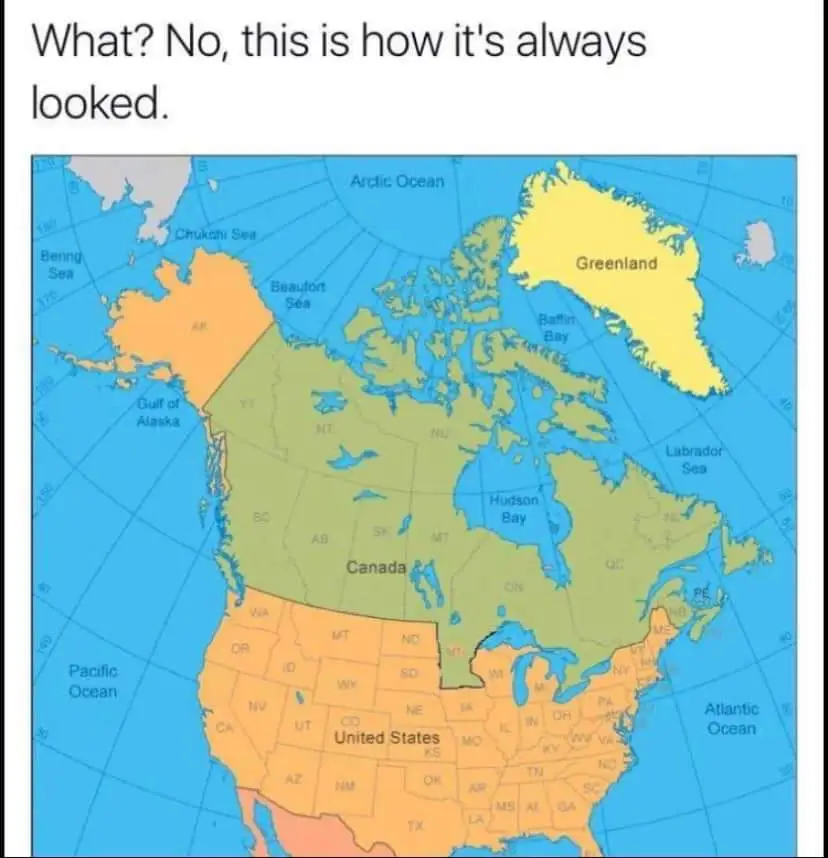If those Americans could read they’d be very upset.
I’d take offense if I could; but you’re right… I think… idk, I can’t think. I’m not upset, you’re upset!
What’s an up set?
Nothing, what’s an up set with you?
This line could’ve come out of Gob’s mouth
Oh my Gob! It’s adventure time… come’on grab your friends
I just use
30°C is hot, 20°C is nice 10°C is cold, 0°C is ice.
Obviously that won’t apply everywhere, but in milder climates it works pretty good.
And 40°C is the melting point of the human brain.
Which goes some way towards explaining some of the decisions happening in Florida, Texas and Arizona during their ridiculously hot summers…
I understand and appreciate your joke, but is it really? And I imagine that the bones and skin would melt first, right? Idk. I’ve never considered that someone could melt from the inside.
Not literally, no, but it can be very difficult to concentrate on anything else when you’re suffering under immense heat and a lack of concentration can lead to a figurative brain meltdown.
That being said, the brain is mostly fluid, fat and electric connections so it would DEFINITELY melt long before your bones.
Would have to be around 50-60°C for the 60% of it that’s fat to hypothetically melt if exposed directly to the heat rather than protected by the skull and cooled down by the blood, but that’s nothing compared to the 1670°C melting point of human bones.
Btw, I hope you’re happy with this reply since my Google search history looks rather grisly now 😂
Thank you kindly for your research! 😁
You’re very welcome 😁
Well, looks like, we have to test that. Any volunteers?
and 30C° is a typo
All those are still shorts weather.
40 is dying 50 is dead
I’ve been dead a few times this summer.
I guess, I am dying.
What would you then call sauna temperatures which range between 80 to 120?
What’re ye units? Can’t know what ye measure unless ye specify! 🦜
And it’s always helpful to remember that 40 below is 40 below, in both F and C.
(Whew, ninja edit so I don’t look like an idiot, on Reddit I’d already have six people correcting me)
More like 30° I’m melted into the pavement, 20° warm but good, 10° is near perfect, 0° starts getting cols, -10° put on a jacket, -20° and below put on a good jacket.
That doesn’t rhyme for shit, man. Ha :)
I’m going to try and add some flair to your post
I don’t know how I didn’t realize yours rhymed, whoops I feel dumb
Don’t feel dumb man, trying to make yours rhyme is fun actually. I like that you added other temps. That’s how I learned it in America as a kid and remembered it, because it rhymes.
Spot on
“30°C is hot” - laughs in Texan
Texas is Hell though. Anyone who’s been there understands this. From the heat to the guns to the people, it’s far and away the least desirable or interesting place I’ve been to. Austin wasn’t terrible though.
Austin is the common “island of sanity” that happens with American cities. Is it enough to say in Texas… Not for me.
Don’t Texans just stay in air-conditioned buildings and vehicles all the time? I just saw a YouTube video where a guy in Texas was complaining that his air conditioning setup wouldn’t get the temperature below 76°F, which I found odd since I set the thermostat on my AC to 26°C (which is nearly 79°F.)
Yeah that’s absolutely a thing all over warm weather states in America. It drives me crazy that I try to acclimate to the higher heat and just end up inside with 68° air conditioner settings. Absolutely freezing my ass off. But the reality is that is more middle/ upper class living. If you’re doing manual labor or living in poverty, you know what the heat is actually like.
What’s -10°C then?
It doesn’t fit into the rhyme, but -10°C is the point where just wearing a coat isn’t enough. You need to either start limiting the time you spend outside or put some serious thought into the protective clothing you wear beyond just throwing a coat on as you go out the door.
I had a water bottle in my car when it was around -11 °C, and when I tried to drink it, the supercooled water instantly froze solid, which was startling, but hardly surprising.
Colder, like the shoulder I’m giving you. 😆
Why?
Cause you didn’t rhyme! Give it a try sometime! 😆
For the other Americans that came into the thread hoping to see a conversion:
- 10c = 50f
- 30c = 86f
Edit: I’d like to note that 10c is a very reasonable temperature for shorts. I’m a Minnesotan (basically Canada lite (please annex us)), people start raising eyebrows at around 0C
F = C * 1.8 + 32
Just want to leave this here
Oh come on. Now you expect us to learn math too??
And if you want to do the math fast and just get close enough, you can just do “double it and add 30”.

deleted by creator
its true, legs are immune to cold. shorts and a jacket is a reasonable outfit
0C? Fellow Minnesotan here and I’ve definitely seen plent of people wearing shorts at temps below -5C. But I’m also in a college town so that may change things.
I once amusedly watched girls sunbathe in bikinis at St. Lawrence University with patches of snow nearby in, I think March.
Conversely, I personally wore shorts and a tee one fine vacation in Florida around Christmas. It was 60f, and everybody was running around in jackets looking like they were in Chicago in January.
Lmao, that brings back memories of going to open gym in high school while wearing basketball shorts in -40 with my winter jacket on
I learned during the polar vortices that when it’s -40 out it’s the same in both Celsius and Fahrenheit
Yeh 0C was exactly what I thought and then you mentioned it.
The quick conversation I use is take off 30 and half the rest to go F to C or double it and add 30 to go C to F.
20C doubled is 40 and add 30. 70F
80F take off 30 is 50. Half that is 25. 25C
It’s not completely accurate but close enough for conversation purposes.
Paraphrasing an old meme:
Fahrenheit - how hot humans feel
Celsius - how hot water feels
Kelvin - how hot atoms feelWhat about Rankine?
Pretentious freedom-loving atoms
How measuring devices see it:
| Celsius | How hot humans feel | | Fahrenheit | Measure Celsius and do a calculation | | Kelvin | Measure Celsius and do a calculation |
Clearly, Celsius is superior here
C° or °C bud?
Jokes on you. I’m an american who works with scientific equipment so I mainly work in Celsius. Also live in Minnesota so we get the best of both worlds. Last winter hit almost -30C at times meanwhile tomorrow has a high of 39C with almost 70% humidity.
I was going to make the joke that Minnesotan kids definitely know what -40°C is.
I moved up here from Florida to get out of this kind of heat and humidity. Thanks Minnesota. This is miserable.
Minnesota is just lower Manitoba, you get the same insane 80c temperature variance
Lower Manitoba 😂 so that makes Saskatchewan into Northest Dakota and the Okanagan is Upper California?
Correct! America is just Canada’s pantalons
I love the annual tradition of people posting youtube videos in which someone throws a bucket of water and it instantly turns to snow.
Americans know about °C, but what the hell is C°?
It’s °C, but the temperature increases exponentially with every higher number
Oh shit.
I prefer free health care units
Most kids don’t get degrees.
Heyooo!
Here’s a rough C° primer for Americans
0° or below, fucking cold
1° - 10° cold
11° - 20° cool
21° - 30° warm
31° - 40° hot
41° or above - Jesus Christ I’m on fire!
As for Fahrenheit for the rest of the world, on a scale from 0 to 100, how hot is it? Assume anything below zero is really fucking cold, and anything above 100 is really fucking hot.
-10° - -1° very cold
0° Water freezes
1° - 5° Cold
6° - 10° cool
11° - 16° warm
17° - 25° hot
26° - 30 very hot
Found the Canadian
No, just the reasonable guy.
Yup. Where I live we have seen down to -20F (during that time texas almost lost their power grid) and up to 115F.
Its currently 110F. Aka, hot.
Or, -28c to 46C. Currently 43C. And 40% humidity. Feels horrible.
I was in Dubai earlier this year and the heat index was 53⁰C. Felt like I was being baked alive.
I get metric for everything else, but °F is the better system for everyday/non scientific use. I will die on this hill.
That’s because Fahrenheit is % of hot, based on what we feel. Therefore, °F is better for everyday use.
The one you use is the better system. I want to know whether I should bring a sweater. The system is arbitrary.
In what way is 0F helpful at all?
That’s when we feel 0% hot.
I certainly know what degrees Celsius are, but I have no idea what Celsius degrees are supposed to be.
I thought that was the point Americans allegedly wouldn’t understand. Glad I wasn’t the only one that noticed the error in a meme trying to make another culture looks like idiots.
Annotation? Idk, I can’t read as is
deleted by creator
Kelvin gang
deleted by creator
I don’t know if they stopped, but American kids at least used to be taught both Celsius and Fahrenheit. At least in some parts anyway. I was taught both as a kid, with my school largely banning the use of Fahrenheit by staff on campus even, for instance.
I was taught both.
Just like I was taught both metric and imperial.
I use both temp scales, though fahrenheit is more common.
I use both measurements scales, though imperial is more common.
One thing I’ve never understood though. Metric is more precise for measurements (at least without needing to involve fractional measures). I totally get why it’s superior for a lot of things, and indeed it is used in many places for this exact reason.
Why would anyone say Celsius is better? Apart from freezing and boiling temps seeming somewhat arbitrary with fahrenheit, does it not allow for much higher precision with regards to temperature identification without resorting to decimals? Isn’t this the same rationale used with metric vs imperial? It seems like a double standard to me, because remembering two temperatures (for boiling and freezing) seems like a small price to pay for a more precise system.
deleted by creator
I’ve always thought Fahrenheit was the better measurement in regards to weather. 0 F is uncomfortably cold, 100 F is uncomfortably hot. It makes so much sense for the weather. 0 C is freezing, 100 C you are dead. Of course, for most things Celsius makes more sense, and even though I live in the US I don’t even know how to measure computer temperatures in F, it just sounds crazy. When it comes to weather though? Fahrenheit is where it is, in my opinion.
Please guys, I know plenty of you will disagree with me, that’s okay, this is just my opinion. Please don’t get upset I know metric is generally better!
I always found fahrenheit a lot more arbitrary: in Celsius 0 is the freezing of water, so if you are driving/walking, that is a very important temperature to look out for. Also 30 being hot or 100 being hot outside does not really make a difference. Some people find 30 hot, some other find it OK, since its subjective anyway
deleted by creator
Water freezes at 0°C at standard pressure, sea level.
If you are above or below, it will be different.
Saying “It’s not 0°C outside so there’s no ice on the road” is dumb. Because there could definitely be ice on the road.
You should be looking out for other things while driving. Not if the one thermometer, who knows where, is saying that it’s 0°C or not.
As usual, there should be a bit of flexibility in there. I am not saying “oh, it’s 0C, therefore ALL water in all town is frozen , lets wait until it gets to 1C so all water melt”. But more on the line “oh, its around 0C (+ or - 5C), lets be careful while driving because some of the streets might have ice”. Farenheit freezing temp is 32 I think? Thats VERY arbitrary. A lot more than C.
- or - 5°C
23°F to 41°F is -5°C to 5°C
If it’s below 40°F I’d be cautious of Ice. Once again, it doesn’t matter that water freezes at exactly 32°F at standard pressure.
It’s like boiling water. No one puts a thermometer in water to make sure that it hits 100°C exactly.
150°F water will scald you in a second (65°C)
140°F water will scaled you in 3 seconds (60°C)
120°F water will scaled you in 10 minutes (50°C)
+100°F water has the potential to scaled you (~40°C)
I’d rather know that +100°F water has a chance to burn me than remembering +40°C has a chance.
That’s way more important knowledge than the freezing and boiling temperatures of water at standard pressure.
Fahrenheit is asking a human how hot it is, Celsius is asking water. This is what I was taught. I have no idea how you ask water for anything
deleted by creator
Billions of people use Celsius to determine how hot it is. Are they not human?
Maybe, maybe not but surely they are mostly water
The problem is that humans are subjective in my opinion. Water is not (or at least not the the degree humans are). With the same pressure, all water freeze at the same temp. Ask a Minnesotan or a Floridian (just to remain within the US, can use Greek/Norwegian for EU) what “cold” means, and they’ll have VERY different answers
No they’re not. They’re just meat popsicles.
I mean, we could get the temperature up to 100 and see which are human and which are meat…
laughs in Finnish sauna
Because precision has nothing to do with it and it’s all about being easy to convert between different units and having sensible zero and 100-points for temperature?
How often do you convert temperature to different units? Isn’t that what we are stupid for doing?
And I would like to know why precision is irrelevant for temperature but relevant for other things.
I’m being genuine, I’m not trying to shit on you. I’m pretty open about liking the metric system, and I think the reason we don’t use it is largely the extreme administrative costs of doing so more than anyone thinking imperial is actually better. I think most agree it’s pretty clearly worse.
But I legitimately don’t understand how people can argue Celsius over fahrenheit when the arguments for fahrenheit largely match those for the metric system.
How often do you convert temperature to different units? Isn’t that what we are stupid for doing?
I was talking about Metric as a whole, where the units of measurement for distance, mass, etc. are easily convertible and the unit for temperature has sensible zero- and 100-points. I would have thought that was obvious.
Why would you talk about metric as a whole in response to a question asking about Celsius in particular? I very openly stated that I understand why metric in general is used for measurements of length, weight, and volume and asked specifically why people argue that Celsius is superior when its weaknesses in comparison to fahrenheit are similar to imperial’s weaknesses in comparison to metric.
I would have thought that was obvious.
Fahrenheit has a fairly sensible 0 - just as Celsius is the temp of ice water, Fahrenheit is the temp of salty ice water.
Why write 36.111 C when you could write 97 F? Its the same reason you write 3cm instead of 0.03m. Its just more convenient even though its the same thing.
Why write 36.111 C when you could write 97 F?
Why write 96.8 F when you could write 36 C? Do you honestly believe that we’re thinking about temperatures in Fahrenheit and then just converting to Celsius when we write them down?
Do you honestly believe that we’re thinking about temperatures in Fahrenheit and then just converting to Celsius when we write them down?
Why on earth would I think that? I made the comparison to other units of measurement to demonstrate why smaller units are useful in some cases. There are cases where its not useful, but there are also many cases where the advantages of Celsius aren’t useful. Neither is inherently better, the correct one to use is the one you know better or the one that fits the use case better.
In fairness to Fahrenheit, you can round it to a whole number with a lesser difference in feel. That’s more for feel though, for measurements of temp in cooking or chemistry, Celsius is useful due to boiling point.
Agreed, though if you are measuring it via instrument then what difference does it make how “round” the number is?
I was more thinking of when you’re telling your friend what the temperature is outside, or scenarios similar to that. It’s not useful in most other applications.
What difference does it make if the temperature is 79 or 80 F? That’s a difference of about half a Celsius, and as a Celsius user, I can tell you that I don’t plan my daily life based on a half a degree difference, or even a one degree difference; 5 degree precision is almost always enough.
deleted by creator
Celsius*
I only use Fahrenheit for cooking with my oven, and that is it. But I’m Canadian.
Celsius is better because it’s the standard used by almost the entire world. If you’re talking with anyone but Americans or you’re working in science then you’re using Celsius.
The rest is just arbitrary - you can get used to either system.
Ah the old “it’s what everyone does so it must be better” argument. A classic.
That’s not at all what I’m saying. I’m saying there’s little to no difference in practical use, except for the convenience of using a standard. Standards make life much easier because you’re talking the same language as everyone else. When you’re pretty much the only country still using Fahrenheit maybe it’s time to think about using the global standard?
Double Celsius and add 30. It’ll get you close enough for environment temps.
10*2 is 20, plus 30 = 50.
(10°C × 9/5) + 32 = 50°F
30 doubled is 60, plus 30 is 90.
(30°C × 9/5) + 32 = 86°F
10°C is mild af. Who tf doesn’t wear shorts when it’s 50F?
If you want to sound more metal, tell people how cold it is in celsius. Was it kinda cold or was it in the negatives?
I find it easier to just remember the approximate table.
0C = 30F
10C = 50F
20C = 70F
30C = 90F



















